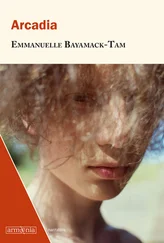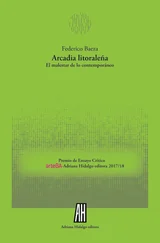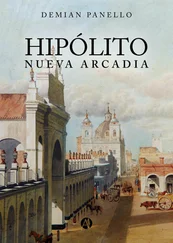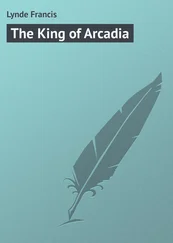Lauren Groff - Arcadia
Здесь есть возможность читать онлайн «Lauren Groff - Arcadia» весь текст электронной книги совершенно бесплатно (целиком полную версию без сокращений). В некоторых случаях можно слушать аудио, скачать через торрент в формате fb2 и присутствует краткое содержание. Год выпуска: 2012, Издательство: Hachette Books, Жанр: Современная проза, на английском языке. Описание произведения, (предисловие) а так же отзывы посетителей доступны на портале библиотеки ЛибКат.
- Название:Arcadia
- Автор:
- Издательство:Hachette Books
- Жанр:
- Год:2012
- ISBN:нет данных
- Рейтинг книги:3 / 5. Голосов: 1
-
Избранное:Добавить в избранное
- Отзывы:
-
Ваша оценка:
- 60
- 1
- 2
- 3
- 4
- 5
Arcadia: краткое содержание, описание и аннотация
Предлагаем к чтению аннотацию, описание, краткое содержание или предисловие (зависит от того, что написал сам автор книги «Arcadia»). Если вы не нашли необходимую информацию о книге — напишите в комментариях, мы постараемся отыскать её.
Arcadia — читать онлайн бесплатно полную книгу (весь текст) целиком
Ниже представлен текст книги, разбитый по страницам. Система сохранения места последней прочитанной страницы, позволяет с удобством читать онлайн бесплатно книгу «Arcadia», без необходимости каждый раз заново искать на чём Вы остановились. Поставьте закладку, и сможете в любой момент перейти на страницу, на которой закончили чтение.
Интервал:
Закладка:
He takes off his own shoes and wallows his toes in the mud.
After some time, Astrid claps him on a thigh and stands. She scoops him up. So light, little Bit, she says. You are maybe twenty pounds? I’m sure I have delivered a new baby almost as heavy as you. You are a marvel.
They come out of the forest onto the Sugarbush path, then up into the Sheep’s Meadow. Already, flowers spread on the ground like small open mouths, purple bells, white stars with golden hearts.
He rests his head on her shoulder, and she says, Not to worry. You will grow. And one day things will not be so confusing. This I can promise you.
When they come into Ersatz Arcadia, she says one last thing into his ear. She says, Don’t think that nobody knows you are not talking, that nobody worries about the words that are stuck in you. But you take your time. When you can, you will tell me the story of everything you feel and I will do everything to make it better. This I also promise you, she says, and Astrid’s face is kind as a field of dandelions.
Astrid carries him into the Henhouse, and only now, in its warmth, does he know how cold he has been. It smells like chamomile and yarrow and lavender, other herbs that hang from the rafters in the kitchen. Someone moans above, and Flannery lopes downstairs naked, with a basin in her arms, her belly vast, her face panicky. She is one of the teenagers who have been showing up every few weeks, petrified but knowing, as they somehow do, that the midwives take care of the Pregnant Ladies who come to them.
Oh, thank God you’re back, she breathes. Marilyn was called off to Amos the Amish’s daughter, and Midge had to go take a nail out of D’Angelo’s foot.
Astrid looks down, and touches Bit’s head, and says, You’ll stay here, in the kitchen, with Flan? We can have our talk after Eden’s baby is born, yes? And Bit nods, though he knows he won’t say a word. Astrid strips off all her clothing and washes herself for a long time with soap and water so hot it steams. When she goes upstairs, she is nude, also.
Flannery puts on a bathrobe and makes a face at Bit. So what’s your story, she says. You’re the retarded one, right? He shakes his head, but she snorts, and gives him a piece of apple cake, and goes off to lie down on the couch. Jesus, she says. I’m definitely not looking to get this little bastard out of me if it’s gonna be like that. She points, finger trembling, skyward.
In a moment, she is asleep and breathing heavily. Bit goes upstairs.
The room is murky where Eden is lying on her back. At first, he can see only the gleam of her coppery hair, then a lady’s swollen bottom and a great upswell of flesh. Astrid is astride her and rubs her belly with something glossy, breathing with her. You must remember, she says, it is a rush, it is good energy, it is the energy it takes to get this baby into the world. There is no pain here. Do not push. All in its own time.
Eden grimaces and gives a low whine, and seems to release something, and Astrid says, Good, good.
Astrid puts two long white fingers into Eden’s folds and feels around. They are bloody when she takes them out. She nods and grunts.
The coil begins to wind again in Eden. Her feet clench. In the middle of the grip, she opens her eyes and sees Bit there at the door and locks her eyes into him, and Bit locks back, pushing the way she pushes at him. Then she relaxes again, and lolls her head back, and Astrid coos, and Eden picks up her head and winks at Bit. Hey, she says. Thanks for that one, Monkey.
Astrid turns. You! she says, Ridley Sorrel Stone! But before she can shoo Bit away, Eden says, No, no. He was helpful, Astrid. I want him here, okay? He’s good at this.
Astrid goes to the doorway and calls to Flannery, who takes Bit downstairs, grumbling, and scrubs him until he hurts. He is naked when he climbs back up, and shivers in the chill. He burrows into the bed with Eden and rests his head against her shoulder. She smells like chicory and fatigue and onions; she is vast and hot. He puts his hands on her forehead and smoothes out the wrinkles there.
The light dies in the windows. People come in and out, among them Abe, worried. He tries to talk to Bit. But Bit is concentrating. People leave. Astrid changes the sheets by rolling both of them over. Someone gives Bit a piece of warm bread with applebutter, but he doesn’t care to eat. He stays with Eden. He sleeps when she naps between waves, and wakens when she surfaces in pain.
Something suddenly shifts in Astrid: she becomes quick, efficient. Flannery rubs Eden’s shoulders. New light kindles in the panes of glass and grows. It is somehow day. Astrid makes coaxing noises, and Eden gives high moans, which Astrid tries to make her lower. Marilyn comes in, fresh and smiling and bearing two quilts and a mince pie, her voice spinning over of the miracle of the Amish baby she just delivered, fat and blue-eyed and rosy as a piglet. Eden shouts, and Marilyn screws up her lips and goes away.
Eden manages to eat some porridge, which comes up. She drinks some tea. She grips Bit’s tiny arms, and he won’t feel the steel in her hands until later, when Hannah will take him to the Showerhouse and cry at the purple on his skin, touching the bruises gently with her fingers, as if to brush them away.
Eden’s body is a fist as she pushes. Bit hears voices saying, Good, sweetheart, so good, the head is here, it’s wonderful, one more, Eden. But Eden gazes into Bit’s face, her canines catch on her lower lip; and in sudden overwhelm, the smell of shit. Then there’s a breaking, a slippage, and in Astrid’s hands there’s a bloody, waxy, frantic beauty, a creature that wags its tiny arms and begins to squawk like a seagull. Eden and Bit rest against one another and watch through half-closed eyes.
Eden lifts her arms up for the baby, which Marilyn has already washed and wrapped in a blanket. Astrid guides the tiny mouth to Eden’s fist-size nipple, and shows the baby how to latch on. It grunts and snorts, the most urgent thing Bit has ever seen.
Bathed in the dim early morning light, in sweat, in exhaustion, Eden swims in the last thrashes of pain. She holds her baby and looks down into the ancient face. Bit takes everything he feels now and buries it deep in him, a secret shining place to visit in his quietness, the best place he has ever known.
The women come for Hannah. They come into the Bread Truck while Abe is still there, before the sun has risen. They bring the spring cold in the pockets of their clothing. Their breath steams in the warmth of the Bread Truck. Up, up, they say, and Hannah stands. Magnificent women, the women of Arcadia, all legs and thin hands, bandannas, white throats, cracks at the edges of their eyes where the sun has creased their skin. They seat Hannah at the table, brush out her hair, braid it up again tightly. They warm water and strip her. Bit’s mother’s body is thin, her bones show, and they wipe her down with hot cloths. Slowly, her smell is thinned with Astrid’s rose soap. Her skin, her hair, her sleep, is watered until, at last, what is her own disappears.
The women take her away.
Abe is distracted during supper, oat groats with soy-sauce, fresh bean curd. Hannah hasn’t been back since the women took her. Bit is free to think his thoughts, and he thinks of how he will go into the forest, soon, to help his mother. He wishes for someone to tell him what to look for, and he hopes that it won’t be someone too frightening or ugly. He listens to the wind in the pines, but it doesn’t talk to him the way it talks to boys in his stories.
When all is cleared and clean in the Bread Truck, Abe deposits Bit at the Pink Piper to sleep in Cole’s hammock. He kisses him gravely and leaves.
The metal roof clicks with tiny icy snow. Astrid’s children breathe lightly. Sweetie’s boys snore and shift, Cole jabs at Bit with his heels. The pile of Family Quonset kids tangle together under the blankets.
Читать дальшеИнтервал:
Закладка:
Похожие книги на «Arcadia»
Представляем Вашему вниманию похожие книги на «Arcadia» списком для выбора. Мы отобрали схожую по названию и смыслу литературу в надежде предоставить читателям больше вариантов отыскать новые, интересные, ещё непрочитанные произведения.
Обсуждение, отзывы о книге «Arcadia» и просто собственные мнения читателей. Оставьте ваши комментарии, напишите, что Вы думаете о произведении, его смысле или главных героях. Укажите что конкретно понравилось, а что нет, и почему Вы так считаете.
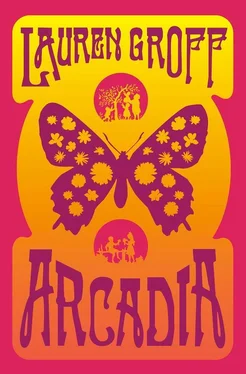
![Andrea Höst - In Arcadia [Touchstone - Extras]](/books/56405/andrea-host-in-arcadia-touchstone-extras-thumb.webp)





